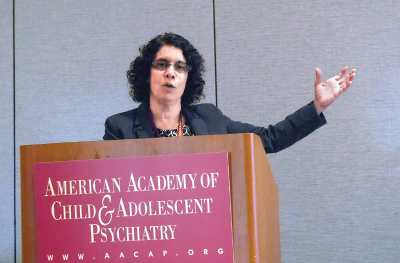Treating young patients with bipolar disorder can be challenging, but a growing body of evidence suggests lithium may be a good place to start, according to researchers at the annual meeting of the American Academy of Child and Adolescent Psychiatry in San Antonio.
“It is important that we recognize bipolar disorder early in youth and treat the disorder as early as possible,” Vivian Kafentaris, M.D., the director of research in the Division of Child and Adolescent Psychiatry at Hofstra North Shore-LIJ School of Medicine, told attendees. “A lot of people—both children and adults [with bipolar disorder]—have been on a multitude of medications but never on lithium.”
The presentation by Kafentaris was part of a session that focused on the results of the Collaborative Lithium Trials, a series of multisite studies examining the safety and effectiveness of lithium for the treatment of bipolar disorder in youth. In particular, she highlighted some data from a study that compared patients (aged 7 to 17 years) with bipolar I/manic or mixed episodes who were treated with lithium for up to eight weeks with those treated with placebo.
The study, which was published in the October Pediatrics, found that patients in the lithium group experienced a greater reduction in manic symptoms (as measured by changes in the Young Mania Rating Scale and Clinical Global Impression–Improvement scores) than those taking placebo.
“Lithium was generally well tolerated with no associated weight gain,” said study coauthor Adelaide Robb, M.D., chief of the Division of Psychology and Behavioral Health at Children’s National Health System. She noted that lithium was also associated with a significant increase in thyrotropin in the blood compared with placebo, which could increase risk for thyroid dysfunction.
“There are many dosing studies for lithium in adults, but not many in children,” said Jean Frazier, M.D., director of the Division of Child and Adolescent Psychiatry at the University of Massachusetts. “Our study was designed to characterize the pharmacokinetics of lithium in youth.”
To determine a safe dose range of lithium without running the risk of blood toxicity in children, Frazier and colleagues exposed 57 patients, aged 7 to 17, with bipolar disorder displaying bipolar I/manic or mixed episodes for eight weeks to varying doses of lithium. The researchers found that safe dosing for lithium in youth ranged from 600 mg to 900 mg a day (equivalent to 27 mg per body weight [kg] a day). Lithium plasma levels averaged at 1.05 mg Eq/L at study endpoint. (Lithium serum levels above 1.5 mg Eq/L increase risk for toxicity.)
“Once you take the body weight into consideration,” said Frazier, “lithium can be just as safe and effective as it is in adults.”
“The earlier lithium is instituted, the more likely it is to be effective,” Kafentaris told Psychiatric News. “If we wait and the severity of the illness progresses, then we run the risk of having to use multiple therapies to achieve mood stabilization, … and a growing concern among lithium experts is whether lithium will be effective after a patient has been on a multitude of medication.”
Although the presenters expressed optimism over the use of lithium in children and adolescents with bipolar I disorder, they emphasized that more research is needed to determine its long-term effects in this population.
The studies were funded by the Eunice Kennedy Shriver National Institute of Child Health and Human Development and the National Institutes of Health. ■
An abstract of the study can be accessed
here.

